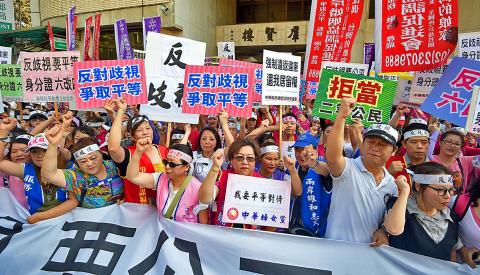The waiting period for Chinese spouses to become eligible for Taiwanese identity papers should be cut to four years from the current six years, the Chinese Nationalist Party (KMT) said yesterday.
In a statement released hours after hundreds of Chinese spouses protested outside the Legislative Yuan in Taipei to call for a reduction in the statutory waiting period, KMT Culture and Communications Committee director Chow Chi-wai (周志偉) said spouses from China should receive the same treatment afforded to those from other countries.
“They are all new inhabitants and new Taiwanese and should therefore be allowed to enjoy the same treatment, rather than being subjected to discrimination and differentiated treatment,” Chow said.

Photo: Lo Pei-der, Taipei Times
Citing statistics compiled by the Ministry of the Interior’s National Immigration Agency, Chow said that as of April, the number of Chinese spouses in Taiwan reached 331,899, accounting for about two-thirds of all foreign spouses living in Taiwan.
“This large group of people should be valued and taken care of by the government,” Chow said. “Instead, they have been facing rules far more stringent than those imposed on spouses from other countries for the application of Taiwanese identity cards.”
Chow said such regulations are unreasonable and discriminatory.
According to the Act Governing Relations Between the People of the Taiwan Area and the Mainland Area (臺灣地區與大陸地區人民關係條例), Chinese spouses must wait for six years before they can obtain a Taiwanese identity card, down from eight years in 2009.
However, for immigrant spouses from other countries, they are permitted to apply for Taiwanese identity papers after four years of residency under the Nationality Act (國籍法) and the Immigration Act (入出國及移民法).
Chow said President Tsai Ing-wen (蔡英文) recently shared a Facebook post by KMT Chairman Hung Hsiu-chu (洪秀柱), calling for an immediate end to discrimination against ethnic groups.
Urging the Democratic Progressive Party (DPP) to open its heart and embrace Taiwan’s new residents, Chow said the party should support the KMT caucus’ draft amendment to Article 17 of the Act Governing Relations Between the People of the Taiwan Area and the Mainland Area to cut the waiting period for Chinese spouses to four years.
Separately yesterday, the KMT’s Central Standing Committee approved the nomination of Adimmune Corp (國光生技) chairman Steve Chan (詹啟賢) to be a party vice chairman.
Chan, who graduated from the Chung Shan Medical University, has previously served as a Presidential Office senior adviser, KMT deputy secretary-general, the Republic of China’s ambassador-at-large, and superintendent of the Chi Mei Medical Center.
Chan is the fourth KMT vice chairman nominated by Hung, after the designation of former Taichung mayor Jason Hu (胡志強), former Taipei mayor Hau Lung-bin (郝龍斌) and Minister Without Portfolio Lin Jung-tzer (林政則) last month.

Taiwan is stepping up plans to create self-sufficient supply chains for combat drones and increase foreign orders from the US to counter China’s numerical superiority, a defense official said on Saturday. Commenting on condition of anonymity, the official said the nation’s armed forces are in agreement with US Admiral Samuel Paparo’s assessment that Taiwan’s military must be prepared to turn the nation’s waters into a “hellscape” for the Chinese People’s Liberation Army (PLA). Paparo, the commander of the US Indo-Pacific Command, reiterated the concept during a Congressional hearing in Washington on Wednesday. He first coined the term in a security conference last

Prosecutors today declined to say who was questioned regarding alleged forgery on petitions to recall Democratic Progressive Party (DPP) legislators, after Chinese-language media earlier reported that members of the Chinese Nationalist Party (KMT) Youth League were brought in for questioning. The Ministry of Justice Investigation Bureau confirmed that two people had been questioned, but did not disclose any further information about the ongoing investigation. KMT Youth League members Lee Hsiao-liang (李孝亮) and Liu Szu-yin (劉思吟) — who are leading the effort to recall DPP caucus chief executive Rosalia Wu (吳思瑤) and Legislator Wu Pei-yi (吳沛憶) — both posted on Facebook saying: “I

Sung Chien-liang (宋建樑), who led efforts to recall Democratic Progressive Party (DPP) Legislator Lee Kun-cheng (李坤城), was released on bail of NT$80,000 today amid outcry over his decision to wear a Nazi armband to questioning the night before. Sung arrived at the New Taipei District Prosecutors’ Office for questioning in a recall petition forgery case last night wearing a red armband bearing a swastika, carrying a copy of Adolf Hitler’s Mein Kampf and giving a Nazi salute. Sung left the building at 1:15am without the armband and covering the book with his coat. Lee said today that this is a serious

A court has approved Kaohsiung prosecutors’ request that two people working for Democratic Progressive Party (DPP) Legislator Lin Dai-hua (林岱樺) be detained, as a probe into two cases allegedly involving her continues. The request was made on Friday, after prosecutors raided Lin’s two offices and the staffers’ residences, and questioned five on suspicion of contravening the Anti-Corruption Act (貪汙治罪條例). The people included the directors of Lin’s Daliao (大寮) and Linyuan (林園) district offices in Kaohsiung, surnamed Chou (周) and Lin (林) respectively, as well as three other staffers. The prosecutors’ move came after they interrogated Lin Dai-hua on Wednesday. She appeared solemn following